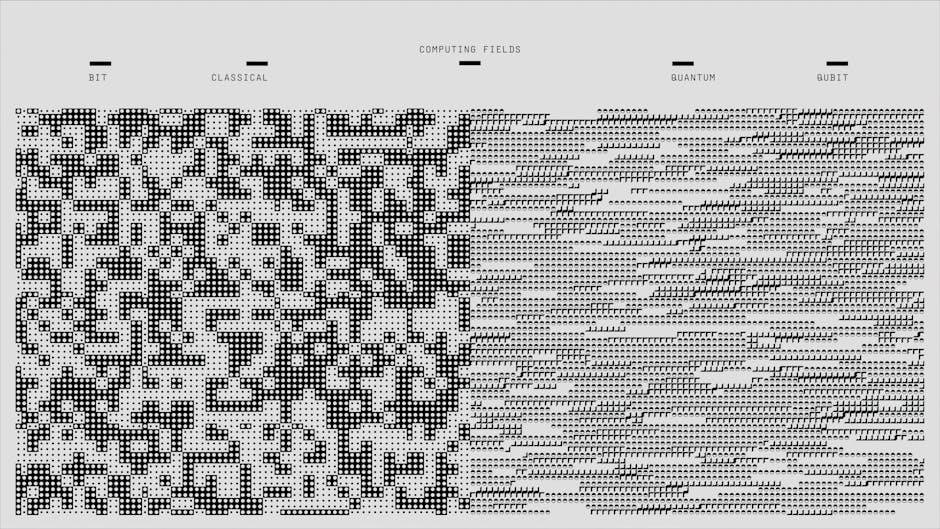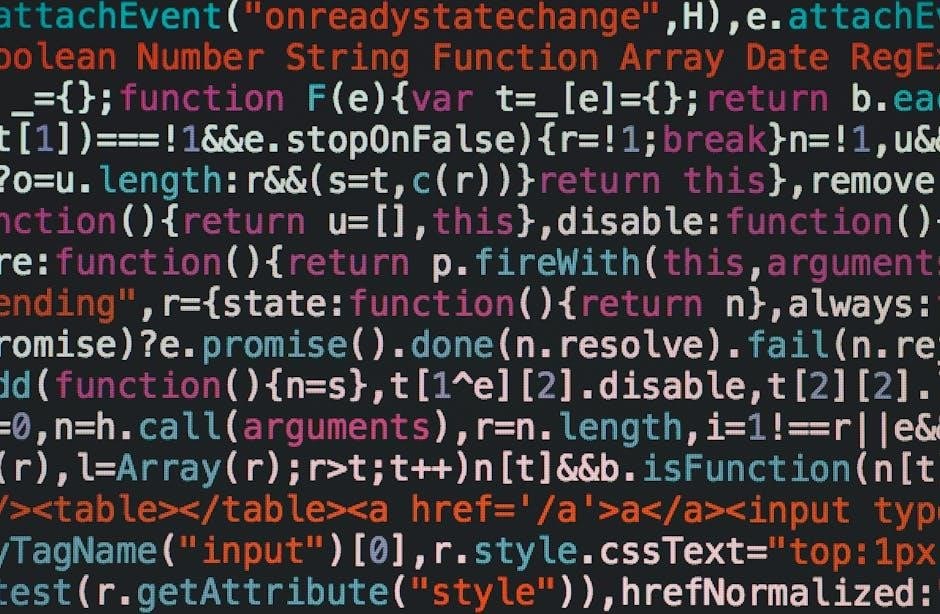“Cracking the Code PDF” is a comprehensive guide for coding interviews‚ offering strategies‚ algorithms‚ and practical examples to decipher complex codes and prepare for real-world challenges.
1.1 Overview of the Book
“Cracking the Code PDF” is a comprehensive guide designed to help aspiring coders excel in interviews. The 6th edition includes 70% more content‚ with additional questions‚ revised solutions‚ and new chapters. It focuses on problem-solving strategies‚ algorithms‚ and deciphering complex codes. The book provides real-world examples and case studies‚ making it a valuable resource for coding interviews. Its practical approach and updated content ensure readers are well-prepared for modern coding challenges‚ offering insights into effective problem-solving and coding techniques.
1.2 Importance of the Book in Coding Interviews
“Cracking the Code PDF” is indispensable for coding interviews‚ offering insights into problem-solving strategies and deciphering complex codes. The 6th edition’s updated content‚ including additional questions and revised solutions‚ prepares candidates for modern challenges. It bridges theory and practice‚ providing real-world examples and case studies. The book’s focus on algorithms‚ data structures‚ and effective problem-solving techniques makes it a vital resource for aspiring coders. Its practical approach ensures readers understand how to apply coding skills in interview settings‚ enhancing their chances of success.
Key Concepts and Techniques
“Cracking the Code PDF” focuses on problem-solving strategies‚ mastering algorithms‚ and deciphering complex codes. It provides techniques to break down challenges and apply coding skills effectively.
2.1 Understanding Problem-Solving Strategies
Understanding problem-solving strategies is crucial for tackling coding challenges. “Cracking the Code PDF” emphasizes breaking down complex problems into manageable parts‚ using logical reasoning‚ and recognizing patterns. It highlights the importance of understanding the underlying principles of ciphers and codes‚ enabling effective application of techniques. Practical examples and real-world scenarios illustrate how to approach coding problems methodically. This section equips readers with the foundational skills needed to decipher codes and solve algorithmic puzzles‚ making it a cornerstone of the book’s educational approach.
2.2 Mastering Algorithms and Data Structures
Mastering algorithms and data structures is essential for success in coding interviews. “Cracking the Code PDF” focuses on common data structures like arrays‚ linked lists‚ stacks‚ and queues‚ and algorithms such as sorting‚ searching‚ and graph traversal. The book provides detailed explanations and practice problems to help readers understand and implement these concepts effectively. Dynamic programming is also emphasized‚ with strategies to break down complex problems into manageable subproblems. Regular practice and real-world applications are encouraged to reinforce these foundational skills.
2.3 Approaches to Deciphering Complex Codes
Deciphering complex codes requires a combination of reverse engineering‚ pattern recognition‚ and logical reasoning. The book emphasizes understanding the underlying principles of ciphers and applying systematic approaches to decode them. Techniques like frequency analysis and substitution are explored‚ along with advanced methods for tackling modern encryption challenges. Practice exercises and real-world examples help readers refine their skills in breaking down intricate coding problems‚ fostering a deeper understanding of both offensive and defensive coding strategies.

The Evolution of “Cracking the Code”
“Cracking the Code” has evolved through multiple editions‚ with the 6th edition offering 70% more content‚ including new questions and revised solutions‚ making it a go-to resource.
3.1 History of the Book and Its Editions
First published in 2008‚ “Cracking the Code” has become a cornerstone for coding interview preparation. Each edition‚ including the 6th‚ adds fresh content and refined solutions to meet evolving industry demands‚ ensuring it remains a vital tool for aspiring software engineers. Over the years‚ the book has expanded its scope‚ incorporating new algorithms and real-world examples to help candidates excel in technical interviews. Its growth reflects the dynamic nature of coding challenges‚ solidifying its reputation as a must-have resource.
3.2 Updates in the 6th Edition
The 6th edition of “Cracking the Code PDF” introduces significant updates‚ including 70% more content compared to the previous edition. It features additional practice questions‚ refined solutions‚ and fresh chapters to help candidates master modern coding challenges. The book now covers emerging topics in software engineering‚ such as system design and behavioral interviews‚ ensuring readers are well-prepared for today’s technical assessments. These updates reflect the evolving nature of coding interviews‚ making the 6th edition a indispensable resource for aspiring software engineers.

Practical Applications
“Cracking the Code PDF” offers real-world examples and case studies‚ enabling readers to apply problem-solving strategies and algorithms in actual coding scenarios‚ enhancing their interview preparation and technical skills.
4.1 Real-World Examples of Code Cracking
“Cracking the Code PDF” provides numerous real-world examples‚ such as deciphering encryption algorithms and debugging complex systems. These examples help readers understand practical applications of problem-solving techniques. The book also includes case studies from industries like finance and cybersecurity‚ where code cracking is essential. By learning how to approach these scenarios‚ readers gain hands-on experience in tackling coding challenges. Such examples bridge the gap between theoretical knowledge and real-world implementation‚ making the book invaluable for interview preparation and professional growth in coding fields.
4.2 Case Studies in Coding Interviews
“Cracking the Code PDF” includes detailed case studies from actual coding interviews‚ showcasing how candidates approached and solved complex problems. These studies highlight common pitfalls and successful strategies‚ offering insights into interviewer expectations. By analyzing these real-world scenarios‚ readers can better understand how to articulate their thought process and implement solutions effectively. The case studies cover a range of industries and coding challenges‚ providing practical lessons for improving interview performance and problem-solving skills.

Resources and Tools
“Cracking the Code PDF” provides supplementary materials and recommended tools to enhance coding practice‚ including updated resources in the 6th edition for improved problem-solving skills and confidence.
5.1 Supplementary Materials for Practice
The 6th edition of “Cracking the Code PDF” offers extensive supplementary materials‚ including additional practice questions‚ revised solutions‚ and interactive tools to enhance coding skills. These resources provide hands-on experience with real-world coding challenges‚ helping users master problem-solving strategies and improve their understanding of algorithms and data structures. The materials are designed to complement the book‚ ensuring a comprehensive learning experience for coding interviews and beyond.
5.2 Recommended Tools for Coding Challenges
For coding challenges‚ tools like LeetCode‚ HackerRank‚ and CodeSignal are highly recommended. These platforms offer interactive coding environments‚ practice problems‚ and real-world scenarios to test skills. Additionally‚ code editors such as VS Code and IntelliJ provide advanced features for debugging and writing clean code. Version control tools like Git are essential for managing projects and collaborating effectively. These tools‚ combined with the strategies from “Cracking the Code PDF‚” help coders refine their problem-solving abilities and prepare for technical interviews.
Avoiding Common Mistakes
Candidates often overlook edge cases‚ misread questions‚ or rush into coding without planning. Practicing problem-solving strategies and debugging thoroughly can help mitigate these errors and improve outcomes.
6.1 Pitfalls in Coding Interviews
Candidates often overlook edge cases‚ misread questions‚ or rush into coding without planning. These mistakes can lead to incorrect solutions or inefficient algorithms. Additionally‚ neglecting to debug thoroughly or failing to optimize code can negatively impact performance. Another common pitfall is not communicating thought processes clearly‚ making it difficult for interviewers to assess problem-solving skills. Practicing structured approaches and methodically addressing each problem can help avoid these traps and improve overall performance in coding interviews.
6.2 Tips for Effective Problem Solving
Effective problem-solving begins with breaking down complex issues into manageable parts. Prioritize understanding the problem deeply before coding. Always plan your approach‚ considering edge cases and optimizations. Practice explaining your thought process aloud to clarify ideas. Leverage familiar algorithms and data structures while staying adaptable. Avoid overcomplicating solutions—simplicity often yields the best results. Regular practice and reviewing past mistakes are essential for improvement. Stay calm and methodical‚ ensuring each step logically follows the previous one to achieve efficient and correct solutions.

The Future of Coding Interviews
The future of coding interviews is evolving with advanced tools and AI-driven assessments‚ enhancing the evaluation of coding skills and problem-solving abilities efficiently.
7.1 Emerging Trends in Coding Assessment
Emerging trends in coding assessment include AI-driven platforms that evaluate problem-solving skills and coding proficiency. These tools use automated systems to analyze code quality‚ efficiency‚ and correctness. Real-time coding environments simulate actual workplace scenarios‚ allowing recruiters to assess practical abilities. Additionally‚ there is a growing emphasis on behavioral and cognitive assessments to gauge how candidates think and communicate their solutions. These advancements aim to create a more comprehensive and accurate evaluation process for coding interviews‚ ensuring better alignment with real-world demands and company needs. These trends are reshaping how coding skills are measured and evaluated in the industry.
7.2 The Role of AI in Code Evaluation
AI plays a pivotal role in modern code evaluation‚ enhancing accuracy and efficiency. Advanced algorithms analyze syntax‚ logic‚ and performance‚ providing instant feedback on coding submissions. AI-driven systems can detect plagiarism‚ identify inefficiencies‚ and even predict potential errors. They enable personalized learning experiences by tailoring assessments to individual skill levels. Furthermore‚ AI facilitates real-time evaluation during interviews‚ allowing recruiters to assess problem-solving under pressure. This technology ensures a more objective and scalable approach to coding assessments‚ revolutionizing how candidates are evaluated in the tech industry while maintaining high standards of quality and fairness.
“Cracking the Code PDF” is an invaluable resource for coding interviews‚ offering insights‚ strategies‚ and practical examples to excel in problem-solving and technical challenges.
8.1 Final Thoughts on “Cracking the Code PDF”
“Cracking the Code PDF” remains a pivotal resource for coders‚ offering a wealth of knowledge on problem-solving‚ algorithms‚ and real-world applications. Its updated 6th edition provides enhanced insights‚ making it indispensable for both newcomers and seasoned professionals. By bridging theory with practical examples‚ the book equips readers to tackle coding challenges confidently. As coding interviews evolve‚ “Cracking the Code PDF” continues to be a trusted guide‚ ensuring aspiring developers stay ahead in their journey to master coding skills and succeed in the competitive tech industry.



